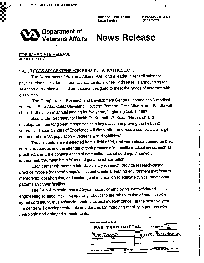Department of Veterans Affairs
Office of Public Affairs
News Service
June 27, 1997
  |
| Home | Projects | People | Publications | Places |
| Previous Story | Press | Next Story |
  |
VA selects six centers for Rehabilitation
Research The Department of Veterans Affairs (VA), long a leader in rehabilitation for physical disabilities due to traumatic accidents, injuries, or disease, is announcing the selection of six sites focused on research designed to meet the needs of veterans with disabilities. The Rehabilitation Research and Development Centers, located at VA Medical Centers in Palo Alto, CA; Cleveland; Houston; Portland, OR; Atlanta; and Seattle will share $4.5 million in funding for five years beginning October 1, 1997. Said Under Secretary for Health Dr. Kenneth W. Kizer, "Research and development has long been recognized as a key asset in improving the health of veterans. These Centers of Excellence will direct effort and resources toward a large segment of our VA population - veterans with disabilities." The six centers were selected from a field of 24, and were chosen based on their current resources and the strength of their proposals in specific medical areas, such as prosthetics and the consequences of amputation, spinal cord injury, sensory impairment, traumatic brain injury, and geriatric rehabilitation. Each center will promote interdisciplinary research, provide research-based practice models for specific populations and create a learning environment that fosters mentorship, collaboration, and exchange of information to educate clinical practitioners, patients, and their families. The Palo Alto center has a 20-year history of employing state-of-the-art engineering science, including applying robotics to the rehabilitation of persons with spinal cord injury, thus enhancing their functional independence. In the next five years, the center will develop treatments and devices for improving mobility in persons with neurologic and orthopedic impairments. The Cleveland center will continue its work in functional electrical stimulation (FES) to activate paralyzed muscles by preparing for and initiating clinical trials of FES technology to help restore bladder and bowel control to individuals with spinal cord injury and to provide limited mobility in individuals with stroke or paraplegia. The Houston center is focused on the consequences of disability as a person ages, an area of research critical to veterans who were injured in Vietnam, Korea, and World War II and are now facing new aftereffects of their disabilities. The center will use a physical, mental, social, and spiritual approach to design, implement, and evaluate programs to prevent complications from common secondary conditions such as pressure ulcers, malnutrition, and mobility limitations. A center of rehabilitative auditory research has been proposed by the Portland VA Medical Center. Veterans with service-connected hearing disorders, more than 300,000, represent the largest group of veterans with service-connected disabilities. Research at this center will be dedicated to alleviating the communicative, social, and economic problems resulting from auditory system impairment, hearing loss, and tinnitus. Over the past seven years, the Atlanta VA Medical Center has made important contributions in geriatric rehabilitation. With interdisciplinary collaborations among center investigators at three major university affiliates, the center will narrow its focus of research to three areas: vision, environment and behavior, and exercise and physical performance and the inter-relationships among these areas. The Puget Sound center, located in Seattle, will build on its strong traditions of prosthetic research dating back to the 1960s to develop research relevant to veterans with potential and actual limb loss. The center will create a program for the prevention of limb loss, develop more effective tools for assessing the benefits of salvage versus amputation, and improve the design of below-the-knee prostheses. |